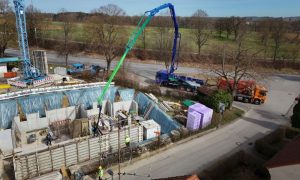VAT to encourage accountability in construction, experts say
Introduction of tax unlikely to have any long-last adverse impacts on industry

Although concerns have been expressed about the impact the introduction of VAT could have on the construction industry, leading experts have told Big Project ME that it is unlikely that the taxation scheme could have an adverse impact in the long run.
Dr Anil G Pillai, chairman and CEO of Airolink Group, a UAE-based construction contracting company, said that he believes VAT will be good for all businesses, not just the construction industry as it would encourage owners to be more cautious and would curtail overspending.
“You’ve got to have very good administration, plus accountability (for VAT). When accountability comes into the picture, people are more cautious about how they spend,” Pillai told Big Project ME during an interview at his offices.
“They have educated themselves how to move forwards. VAT is a fantastic idea – I can understand that we’re losing out on 5%, but I say that we can call that an administrative cost you’re paying to the government.
“In all the countries that have had an economic boom, they have had some type of accountability. In the UAE, before VAT, there was no accountability and a lot of corruption going on, so I think the government did a fantastic job implementing the 5% VAT, it’s a step in the right direction,” he continued.
Sameer Daoud, group chief development officer and managing director for Drake and Scull International (DSI), said that while many see VAT as adding an additional layer of complexity, he doubts that there will be any negative effects on investment.
“I doubt that VAT will have any adverse effect on investment in the long run. The simple reason is that this has not been the case anywhere else in the world,” Daoud said in an exclusive opinion piece for Big Project ME.
“In contrast to income tax, which has a negative effect because there is less money to invest, the introduction of VAT is a corporate tax that benefits the nation as a whole. As a VAT-registered company, this is a simple throughput that is not a complicated process at all, as long as it is clear what VAT applies to, and when.
“Ensuring compliance across the supply chain with the new tax entails significant efforts both from within organisations and between business partners. The high number of parties involved with supplier and sub-contractors quickly creates complexities, making it difficult in to gain a proper overview of transactions,” he continued.
In order to resolve the issue, Dr Pillai has called for VAT education to be made available for the construction industry in the UAE, explaining that its rapid introduction has caught some companies unawares.
“We need education for this (VAT introduction). The implementation was very quick, without any proper education for people. But now, I can see that the government had the right idea, because you can’t just educate people for a certain period. Instead, it’s an everyday educational process. In this country, their decision was absolutely right – you educate with the problem and you’re forced to adapt. It’s a fantastic idea.”



















